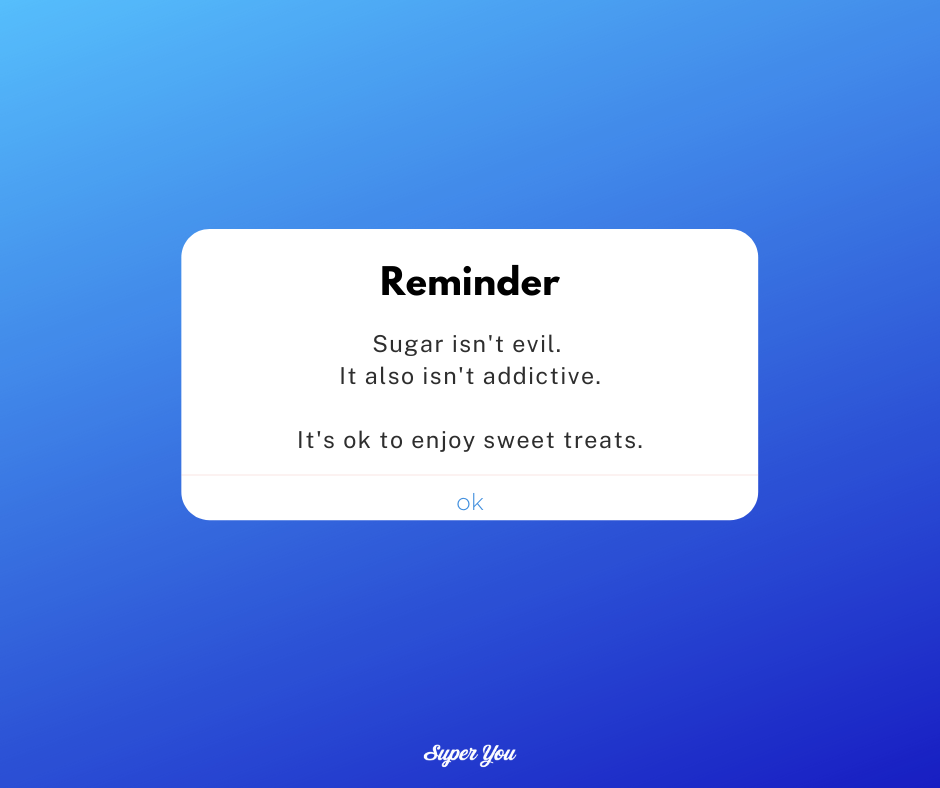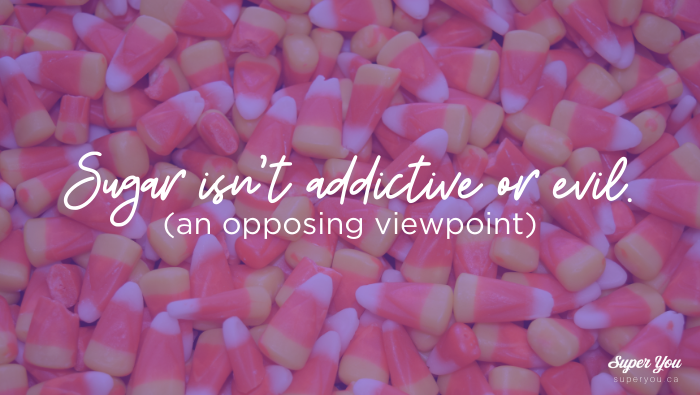Well, it’s Halloween week and I’m stirring the pot talking about sugar. Really? I know.
Not sure if you saw it…but yesterday I created quite the hubbub with a post (shared below).
My intent in sharing the post was to help people. In my personal and professional experience the stress that surrounds the “food holidays” can be intense. And the internalized judgement, criticism and resultant stress are far more damaging to our overall health and well being than simply having a few Halloween treats.
Why did I share it?
I shared it as a pro-active measure. Because your newsfeed is about to be bombarded by a whole slew of “health tips” and “Halloween hacks” detailing how you can avoid those (evil) halloween treats. And there’s a chance that those “helpful tips” may leave you feeling like having that mini snickers is legit the end of the world! And I want you to really here this: it’s not!
You know the ones…
- “Buy the ones you don’t like!”
- “Don’t buy any at all (heck, it’s a Pandemic anyway, who’s trick-or-treating this year?!”
- “Hide them! Or better yet get a loved one to hide them from you!”
- “Don’t open the box until the last minute.”
- “Have a cup of tea! Mmmm. Delicious!”
- “Brush your teeth before you go out, then you won’t be enticed!”
And my favourite….the memes that show you how much cardio you have to do, to “earn” each of your favourite Halloween treats. Usually with a tagline of “is it worth it?”
Because exercise is something we do to earn our food, not something we do because (gasp), it brings us JOY!
(I hope you can “hear” my sarcasm, because it’s HEAVY).
Because every single one of these ideas…they’re all Diet Culture. They’re all stealing your autonomy and demonizing food.
And here’s what happens when we take an authoritarian, restrictive approach with food (Cole’s notes version):
- Restriction is relative to your body’s interpretation of its unique metabolic needs. This means an intake level that may be a completely acceptable in one person, could be relative “restriction” in another. Since you have no “energy gauge” on your body, it’s essential that we utilize our body’s innate hunger signals, not a random calorie count to guide our intake.
- If you abide by restrictive rules around which foods are acceptable and not, if/when you finally do give yourself permission to eat the restricted food, you’re far more likely to over-consume or binge. Because “this is your chance” before the window of opportunity closes again (and you get “back on track”). This is expected behaviour with restriction, not a “loss in willpower” as it’s often viewed.
- When we over-restrict nutrition in general (aka. save yourself for the halloween binge), we can put our bodies into a physiologic state called Primal Hunger. This Primal Hunger state makes you even more likely to over-consume or binge.
- When we over-restrict carbohydrates specifically, we are physiologically driven to crave and seek out carbohydrates. This is because carbohydrates are the primary and preferred energy source for the body, specifically the brain, nervous system and red blood cells.
- When we restrict and are under-nourished we are more prone to thinking (obsessively) about food. Especially the foods we restrict or place “off limits.”
So….is it really sugar “addiction?”
Or is it simply your body compelling you to eat as a biologic rebound from restriction?
More on that in a sec. For now, I want to share “the post” and talk about what happened next (cue the Diet Culture zombies chasing me. I’m being dramatic, but you know about my flair for the dramatic, also Halloween).

This (to the left) is what I posted.
It’s a bit small here on the blog…so here’s what the Reminder says:
Sugar isn’t evil.It also isn’t addictive.
It’s ok to enjoy sweet treats.
I shared the image, along with this text:
A timely reminder this week-o-halloween.#reminder #youareawesome #sugarisnotthedevil
You can see the original post here, feel free to explore the comments. While you’re there, give my page a like if you’re inspired!
Well, let’s just say I ruffled a few feathers. Who knew sugar was such a “hot topic?”
Opinons flew.
Claims of “research” were thrown out.
And all because I challenged the Diet Culture belief that sugar is addictive and evil.
If you believe that claim too, I don’t blame you. Because there have been some really WILD claims about sugar based on some limited research that became “popularized” by documentaries, all claiming the evils of sugars.
I could get into my beef about documentaries, but I’ll save that for another day.
This is what I think needs to be discussed about sugar:
Here’s the thing about the research. There are a lot of conclusions being drawn and they’re being touted as fact.
But research isn’t fact. It’s a theory that hasn’t yet been disproven.
And as with all theories there are about 10 sides to each story. It’s up for interpretation, questioning and disproving.
There is one key piece of research that has been popularized which has perpetuated the notion that sugar is addictive (geek out to the study here).
The study in question was done on rats using sugar water vs. “rat chow.”
In this study, researchers looked at how the rats engaged with sugar water. What they concluded was that the rats exhibited “addictive” behaviour. Specifically, binging, craving and withdrawal. But here’s the interesting part of the study design that isn’t as widely acknowledged, and it’s pivotal to how the results are interpreted.
The only way the researchers could show this “addiction” effect was by restricting the rats food for 12-hours. Ie. it’s probable that the rats weren’t sugar addicted – they were starving and exhibiting the physiologic response to restriction. Namely, binging, craving and withdrawal.
Let me explain this rat tendency to crave, binge and exhibit symptoms of withdrawal from sugar a bit more deeply, because I think it’s important.
Regarding the rats “craving”: When food, specifically carbohydrate is restricted, the body produces a neurochemical called Neuropeptide Y. This neurochemical drives us at a physiologic level to seek food, specifically carbohydrate. This is a biologically driven craving based on our innate primal drive to survive.
Regarding the rats “binging”: This is the natural biologic response to restriction. This is our body’s way of ensuring survival. Why was sugar the preferred fuel for the rats? Because sugar water is a quicker easier way to get carbohydrates into the bloodstream. So of course the restricted, starving rats showed a preference for this fuel source!
Regarding the rats “withdrawal” (which the researchers characterized as signs of anxiety and behavioural depression): If you’ve been without food for 12 hours, don’t you notice your brains tendency to think about food? And felt anxious about how you’d get food? Have you ever felt lethargic with low motivation (behavioural depression) if you’re really hungry? Yeah, me too.
The more important take-away from this study might have been: “food restriction causes Primal Hunger in rats.”
What’s the bottom line?
I think we need to be careful with our words, myself included.
Would I share this post again, possibly. But perhaps with a bit more intention to clarifying in the body of text about why I’m saying these things, as opposed to sharing it as a light-hearted reminder. Duly noted.
Am I suggesting we go into an all sugar, all the time diet? Absolutely not!
Is sugar the most nutritionally dense source of energy for your body? Of course not.
Our body thrives on and requires a wide variety of nutrient dense foods to give us the fuel and energy we need to be healthy, well and vital.
But I also think demonizing and restricting sugar is far more detrimental to our overall health and well-being than simply having a few Halloween treats to celebrate.
What do I want you to take from this?
It’s ok to have a few treats this halloween.
As long as that choice feels good in your body. I hope that your decision to enjoy or skip the Halloween treats is made based on what honours you and your (awesome) body. As opposed to an arbitrary rule from “out there” in Diet Culture.
At the end of the day I want to encourage body autonomy not body authority. Diet Culture implores you to “follow the rules,” and conform to a notion of health which is not defined by you. But rather, somewhat arbitrarily by a set of beliefs and an unrealistic body norm.
I’m not here to tell you you have to do anything. You (and only you) are the boss of your body. Own it. Eat a variety of nutrient dense foods that nourish your body. And if you’re inspired to do so eat the candy that might just nourish your soul.
Have a happy, healthy and safe Halloween season. And if you’d like some support to explore any of the ideas within this blog, I’d love to connect!
